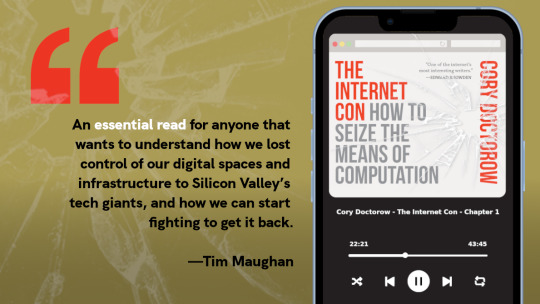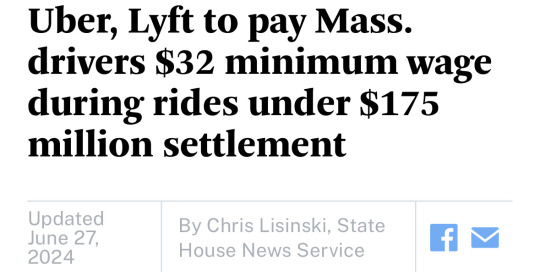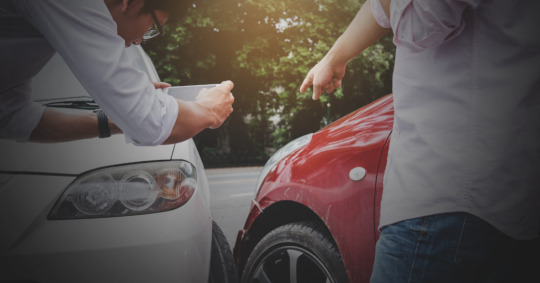#uber lyft rideshare
Explore tagged Tumblr posts
Text
When you take an Uber/Lyft or other ride share service, you're exploiting the driver, who on-average is earning less than $6/hour once their costs as an "independent contractor" are factored in, according to an analysis of 84 million rideshare trips. Stop being an asshole.
286 notes
·
View notes
Text
No, Uber's (still) not profitable

Going to Defcon this weekend? I'm giving a keynote, "An Audacious Plan to Halt the Internet's Enshittification and Throw it Into Reverse," on Saturday at 12:30pm, followed by a book signing at the No Starch Press booth at 2:30pm!
https://info.defcon.org/event/?id=50826

Bezzle (n): 1. "the magic interval when a confidence trickster knows he has the money he has appropriated but the victim does not yet understand that he has lost it" (JK Gabraith) 2. Uber.
Uber was, is, and always will be a bezzle. There are just intrinsic limitations to the profits available to operating a taxi fleet, even if you can misclassify your employees as contractors and steal their wages, even as you force them to bear the cost of buying and maintaining your taxis.
The magic of early Uber – when taxi rides were incredibly cheap, and there were always cars available, and drivers made generous livings behind the wheel – wasn't magic at all. It was just predatory pricing.
Uber lost $0.41 on every dollar they brought in, lighting $33b of its investors' cash on fire. Most of that money came from the Saudi royals, funneled through Softbank, who brought you such bezzles as WeWork – a boring real-estate company masquerading as a high-growth tech company, just as Uber was a boring taxi company masquerading as a tech company.
Predatory pricing used to be illegal, but Chicago School economists convinced judges to stop enforcing the law on the grounds that predatory pricing was impossible because no rational actor would choose to lose money. They (willfully) ignored the obvious possibility that a VC fund could invest in a money-losing business and use predatory pricing to convince retail investors that a pile of shit of sufficient size must have a pony under it somewhere.
This venture predation let investors – like Prince Bone Saw – cash out to suckers, leaving behind a money-losing business that had to invent ever-sweatier accounting tricks and implausible narratives to keep the suckers on the line while they blew town. A bezzle, in other words:
https://pluralistic.net/2023/05/19/fake-it-till-you-make-it/#millennial-lifestyle-subsidy
Uber is a true bezzle innovator, coming up with all kinds of fairy tales and sci-fi gimmicks to explain how they would convert their money-loser into a profitable business. They spent $2.5b on self-driving cars, producing a vehicle whose mean distance between fatal crashes was half a mile. Then they paid another company $400 million to take this self-licking ice-cream cone off their hands:
https://pluralistic.net/2022/10/09/herbies-revenge/#100-billion-here-100-billion-there-pretty-soon-youre-talking-real-money
Amazingly, self-driving cars were among the more plausible of Uber's plans. They pissed away hundreds of millions on California's Proposition 22 to institutionalize worker misclassification, only to have the rule struck down because they couldn't be bothered to draft it properly. Then they did it again in Massachusetts:
https://pluralistic.net/2022/06/15/simple-as-abc/#a-big-ask
Remember when Uber was going to plug the holes in its balance sheet with flying cars? Flying cars! Maybe they were just trying to soften us up for their IPO, where they advised investors that the only way they'd ever be profitable is if they could replace every train, bus and tram ride in the world:
https://48hills.org/2019/05/ubers-plans-include-attacking-public-transit/
Honestly, the only way that seems remotely plausible is when it's put next to flying cars for comparison. I guess we can be grateful that they never promised us jetpacks, or, you know, teleportation. Just imagine the market opportunity they could have ascribed to astral projection!
Narrative capitalism has its limits. Once Uber went public, it had to produce financial disclosures that showed the line going up, lest the bezzle come to an end. These balance-sheet tricks were as varied as they were transparent, but the financial press kept falling for them, serving as dutiful stenographers for a string of triumphant press-releases announcing Uber's long-delayed entry into the league of companies that don't lose more money every single day.
One person Uber has never fooled is Hubert Horan, a transportation analyst with decades of experience who's had Uber's number since the very start, and who has done yeoman service puncturing every one of these financial "disclosures," methodically sifting through the pile of shit to prove that there is no pony hiding in it.
In 2021, Horan showed how Uber had burned through nearly all of its cash reserves, signaling an end to its subsidy for drivers and rides, which would also inevitably end the bezzle:
https://pluralistic.net/2021/08/10/unter/#bezzle-no-more
In mid, 2022, Horan showed how the "profit" Uber trumpeted came from selling off failed companies it had acquired to other dying rideshare companies, which paid in their own grossly inflated stock:
https://pluralistic.net/2022/08/05/a-lousy-taxi/#a-giant-asterisk
At the end of 2022, Horan showed how Uber invented a made-up, nonstandard metric, called "EBITDA profitability," which allowed them to lose billions and still declare themselves to be profitable, a lie that would have been obvious if they'd reported their earnings using Generally Accepted Accounting Principles (GAAP):
https://pluralistic.net/2022/02/11/bezzlers-gonna-bezzle/#gryft
Like clockwork, Uber has just announced – once again – that it is profitable, and once again, the press has credulously repeated the claim. So once again, Horan has published one of his magisterial debunkings on Naked Capitalism:
https://www.nakedcapitalism.com/2023/08/hubert-horan-can-uber-ever-deliver-part-thirty-three-uber-isnt-really-profitable-yet-but-is-getting-closer-the-antitrust-case-against-uber.html
Uber's $394m gains this quarter come from paper gains to untradable shares in its loss-making rivals – Didi, Grab, Aurora – who swapped stock with Uber in exchange for Uber's own loss-making overseas divisions. Yes, it's that stupid: Uber holds shares in dying companies that no one wants to buy. It declared those shares to have gained value, and on that basis, reported a profit.
Truly, any big number multiplied by an imaginary number can be turned into an even bigger number.
Now, Uber also reported "margin improvements" – that is, it says that it loses less on every journey. But it didn't explain how it made those improvements. But we know how the company did it: they made rides more expensive and cut the pay to their drivers. A 2.9m ride in Manhattan is now $50 – if you get a bargain! The base price is more like $70:
https://www.wired.com/story/uber-ceo-will-always-say-his-company-sucks/
The number of Uber drivers on the road has a direct relationship to the pay Uber offers those drivers. But that pay has been steeply declining, and with it, the availability of Ubers. A couple weeks ago, I found myself at the Burbank train station unable to get an Uber at all, with the app timing out repeatedly and announcing "no drivers available."
Normally, you can get a yellow taxi at the station, but years of Uber's predatory pricing has caused a drawdown of the local taxi-fleet, so there were no taxis available at the cab-rank or by dispatch. It took me an hour to get a cab home. Uber's bezzle destroyed local taxis and local transit – and replaced them with worse taxis that cost more.
Uber won't say why its margins are improving, but it can't be coming from scale. Before the pandemic, Uber had far more rides, and worse margins. Uber has diseconomies of scale: when you lose money on every ride, adding more rides increases your losses, not your profits.
Meanwhile, Lyft – Uber's also-ran competitor – saw its margins worsen over the same period. Lyft has always been worse at lying about it finances than Uber, but it is in essentially the exact same business (right down to the drivers and cars – many drivers have both apps on their phones). So Lyft's financials offer a good peek at Uber's true earnings picture.
Lyft is actually slightly better off than Uber overall. It spent less money on expensive props for its long con – flying cars, robotaxis, scooters, overseas clones – and abandoned them before Uber did. Lyft also fired 24% of its staff at the end of 2022, which should have improved its margins by cutting its costs.
Uber pays its drivers less. Like Lyft, Uber practices algorithmic wage discrimination, Veena Dubal's term describing the illegal practice of offering workers different payouts for the same work. Uber's algorithm seeks out "pickers" who are choosy about which rides they take, and converts them to "ants" (who take every ride offered) by paying them more for the same job, until they drop all their other gigs, whereupon the algorithm cuts their pay back to the rates paid to ants:
https://pluralistic.net/2023/04/12/algorithmic-wage-discrimination/#fishers-of-men
All told, wage theft and wage cuts by Uber transferred $1b/quarter from labor to Uber's shareholders. Historically, Uber linked fares to driver pay – think of surge pricing, where Uber charged riders more for peak times and passed some of that premium onto drivers. But now Uber trumpets a custom pricing algorithm that is the inverse of its driver payment system, calculating riders' willingness to pay and repricing every ride based on how desperate they think you are.
This pricing is a per se antitrust violation of Section 2 of the Sherman Act, America's original antitrust law. That's important because Sherman 2 is one of the few antitrust laws that we never stopped enforcing, unlike the laws banning predator pricing:
https://ilr.law.uiowa.edu/sites/ilr.law.uiowa.edu/files/2023-02/Woodcock.pdf
Uber claims an 11% margin improvement. 6-7% of that comes from algorithmic price discrimination and service cutbacks, letting it take 29% of every dollar the driver earns (up from 22%). Uber CEO Dara Khosrowshahi himself says that this is as high as the take can get – over 30%, and drivers will delete the app.
Uber's food delivery service – a baling wire-and-spit Frankenstein's monster of several food apps it bought and glued together – is a loser even by the standards of the sector, which is unprofitable as a whole and experiencing an unbroken slide of declining demand.
Put it all together and you get a picture of the kind of taxi company Uber really is: one that charges more than traditional cabs, pays drivers less, and has fewer cars on the road at times of peak demand, especially in the neighborhoods that traditional taxis had always underserved. In other words, Uber has broken every one of its promises.
We replaced the "evil taxi cartel" with an "evil taxi monopolist." And it's still losing money.
Even if Lyft goes under – as seems inevitable – Uber can't attain real profitability by scooping up its passengers and drivers. When you're losing money on every ride, you just can't make it up in volume.
Image: JERRYE AND ROY KLOTZ MD (modified) https://commons.wikimedia.org/wiki/File:LA_BREA_TAR_PITS,_LOS_ANGELES.jpg
CC BY-SA 3.0 https://creativecommons.org/licenses/by-sa/3.0/deed.en


I’m kickstarting the audiobook for “The Internet Con: How To Seize the Means of Computation,” a Big Tech disassembly manual to disenshittify the web and bring back the old, good internet. It’s a DRM-free book, which means Audible won’t carry it, so this crowdfunder is essential. Back now to get the audio, Verso hardcover and ebook:
http://seizethemeansofcomputation.org

If you'd like an essay-formatted version of this post to read or share, here's a link to it on pluralistic.net, my surveillance-free, ad-free, tracker-free blog:
https://pluralistic.net/2023/08/09/accounting-gimmicks/#unter

Image: JERRYE AND ROY KLOTZ MD (modified) https://commons.wikimedia.org/wiki/File:LA_BREA_TAR_PITS,_LOS_ANGELES.jpg
CC BY-SA 3.0 https://creativecommons.org/licenses/by-sa/3.0/deed.en
#pluralistic#bezzles#hubert horan#uber#rideshare#accounting tricks#financial engineering#late-stage capitalism#narrative capitalism#lyft#transit#uber eats#venture predation#algorithmic wage discrimination
1K notes
·
View notes
Text
By Lev Koufax
Uber and Lyft’s attempts to defeat the minimum wage law aren’t about sustainable business, and they aren’t about protecting the consumer. The cynical decision to withdraw from Minneapolis is simply about keeping the Minneapolis drivers at poverty wages while maximizing profits for rideshare shareholders as much as possible.
#Uber#Lyft#rideshare#workers#Minneapolis#minimum wage#class struggle#imperialism#capitalism#poverty#Struggle La Lucha
216 notes
·
View notes
Text
'MINNEAPOLIS — A rideshare co-op is launching services in Minneapolis in the coming weeks."
"The Drivers Cooperative, founded in New York City in 2021, touts itself as the world's first driver-owned rideshare platform."
"More than 12,000 drivers have joined since then, providing more than 300,000 trips in both the Big Apple and Denver"
#uber#lyft#driver cooperative#minneapolis minnesota#wages#minimum wage#business#economy#ride share#rideshare
10 notes
·
View notes
Text
It finally happened in my city…I saw what is 99% a fake cab. I was waiting for the bus, and a car honked at me and gestured to the vehicle. It had a white decal that said “Uber/Lyft phone #” and no lights or stickers that they usually have in the front window. A big old can of nope.
#it’s been a long time since I’ve seen a fake#also if you are a rideshare newbie: always use the apps for Uber or Lyft#(they’re also not the same company!)#and taxis will have official phone numbers and sites to book#they also have official stands/waiting places#please don’t get into a random car and get mugged
6 notes
·
View notes
Text
"As You Are He"
#egg theory#spotify#reincarnation#near death experience#nde#andy weir#golden rule#reciprocity#ethics#liberal arts#lyft#uber#philosophy#beer#indiana#university#lafayette#rideshare#psychology#carl jung#Spotify
4 notes
·
View notes
Text
Drive with @Uber #Uber Sign up! https://t.uber.com/referral/?invite_code=8h5gdvpwbr2e
Drive with @Lyft #Lyft Sign up! https://www.lyft.com/drivers/STEVE131573?utm_medium=d2da_iacc
Code: STEVE131573
@ubereats 💁🏽♂️🙋🏽♂️🤷🏽♂️🙆🏽♂️🤦🏽♂️ #ubereats #29000 #rideshare #ridesharedriver #ridesharelife #ridesharediaries #rideshareteatime #ridesharestories #uberdriver #lyftdriver #jayz #defjam #rocnation #encore #np #nowplaying #rapmusic #music #rap #hiphop #coversong #coversongs #jayzcover #baltimore #maryland #baltimoremaryland #21229 #edmondsonvillage
Uber (Parody of Jay Z "Encore") https://open.spotify.com/album/7dDO6psO8FQOzckG4rxE9z
Uber Uber Uber Uber Riding Everywhere (Parody of "Ms. New Booty") https://open.spotify.com/track/30EkcCoyCB3sq4DQ3M5J7V
2 notes
·
View notes
Text
[ID 1: a headline that says, “Uber, Lyft to pay Mass. drivers $32 minimum wage during rides under $175 million settlement.” Below that, it says “Updated June 27, 2024” and “By Chris Lisinski, State House News Service.”
ID 2: a tweet by More Perfect Union (@MorePerfectUS) that says, “Massachusetts Uber and Lyft drivers are about to get a minimum wage of $32.50/hr while driving. To settle a lawsuit brought by AG Andrea Campbell the companies will pay drivers $175m, implement this wage, and give some drivers money for health insurance, paid sick time, & more.” End ID.]

Source

Source
Let’s go
#good news#uber#lyft#taxi services#rideshare apps#taxi apps#labor rights#us politics#described#image description by me
15K notes
·
View notes
Text
Star Crossed Reviews
Star Crossed Reviews my new #blog post! Ratings are so important nowadays in the #serviceindustry and #foodandbev . So please be kind in your reviews!
In the world of online reviews and customer feedback, your voice carries a lot of weight. Whether you’re rating a restaurant, a rideshare, or a retail store, what you say in that little review box can directly affect someone’s livelihood. For many workers, ratings and reviews aren’t just a reflection of their performance—they’re tied directly to their ability to earn a living. A strong rating…

View On WordPress
#3 out of 5 stars#blog#Dan Cummins#food and beverage#getting better#good service#Lyft#rating#rideshare#service#service industry#Stay at home dad#Uber#Writing
0 notes
Text
Would #colloidalsilver clash with #objectified #puregold #undiluted in a #MilkyWay #arena surrounded by other #galaxies and #stars? This shades I got from #dollartree #sits and #stands at the #walks for #miles at the #makeups for the #runs of the #jogs. Don’t bother diciphering, it just is.

#Ubers#cheaps Lyfts taxis rideshares solar cycles lunar cycles years days months hours minutes seconds splitter ones
0 notes
Text
Rideshare Accident Insurance: How to File a Claim the Right Way

Rideshare services like Uber and Lyft have become essential for Atlanta residents and visitors alike. While these services offer convenience and affordability, they also raise unique challenges when accidents occur, particularly when it comes to insurance coverage. Understanding the nuances of rideshare accident insurance is critical for passengers and drivers alike.
The Basics of Rideshare Insurance
Rideshare companies like Uber and Lyft provide tiered insurance coverage for their drivers, but it varies depending on the driver’s status at the time of the accident:
Offline/Off-Duty: The driver’s personal auto insurance is the only coverage available.
Waiting for a Ride Request: Limited liability coverage is provided, typically up to $50,000 per person for bodily injury, $100,000 per accident, and $25,000 for property damage.
En Route or During a Ride: The most comprehensive coverage applies, including up to $1 million in liability coverage and uninsured/underinsured motorist coverage.
Understanding which tier applies can significantly impact the claims process and the compensation you may receive.
Common Insurance Issues in Rideshare Accidents
Navigating insurance after a rideshare accident can be challenging. Some of the most common issues include:
Confusion Over Coverage: Determining whether the rideshare company’s policy or the driver’s personal insurance applies.
Denial of Liability: Insurance providers may dispute who was at fault, delaying or reducing payouts.
Uninsured or Underinsured Drivers: In cases where the at-fault party lacks sufficient insurance, rideshare company policies may not fully cover your damages.
Policy Gaps: Personal auto insurance policies often exclude coverage for accidents occurring during rideshare activities, leaving some claims unresolved.
Read more: Rideshare Accident Insurance: How to File a Claim the Right Way
#Rideshare Insurance#Accident Insurance#Filing a Claim#Rideshare Claim Process#Rideshare Accidents#Insurance Tips#Rideshare Driver Insurance#Passenger Insurance#Accident Coverage#Insurance Claim Guide#Rideshare Coverage#Uber Insurance#Lyft Insurance#Car Accident Claims#Rideshare Driver Tips#Insurance for Drivers#Accident Claim Help#Claims Process
0 notes
Text
Rideshare Mechanic Services in Orlando
Find a reliable rideshare mechanic in Orlando with Fix My Ride Share. Our expert team specializes in maintenance and repairs tailored for rideshare drivers, ensuring your vehicle is always ready for passengers. We understand the importance of safety and compliance, so we offer comprehensive inspections and services to keep your car in top shape. Drive confidently knowing your vehicle is cared for by professionals. Contact us today for your rideshare maintenance needs!
#Rideshare mechanic Orlando#online uber inspection Orlando#turo car inspection Orlando#uber car inspections near me#uber vehicle inspection online#uber Lyft inspection Orlando#Uber car inspection Orlando
0 notes
Text
Personal Injury Claims Involving Uber, Lyft, and Rideshare Accidents
(injury claims) With the rise of Uber, Lyft, and other rideshare services, millions of people rely on these platforms daily for convenient transportation. However, rideshare accidents are on the rise as well, and when injuries occur, they bring unique legal challenges. If you’re injured in a rideshare accident, here’s what you need to know about filing a personal injury claim and navigating the complexities of Uber, Lyft, and other rideshare-related accidents.
Determining Liability in Rideshare Accidents
In any car accident, determining liability is crucial. With rideshare accidents, the situation can become complex because there are multiple parties involved, such as:
The rideshare driver (if they were at fault)
Another driver (if they caused the accident)
The rideshare company (Uber, Lyft, etc.)
Rideshare companies categorize drivers as independent contractors, not employees, which often limits the companies’ direct liability. However, Uber and Lyft do provide insurance coverage for their drivers under certain conditions, which can benefit injured passengers or other affected parties.
Understanding Rideshare Insurance Coverage
Uber, Lyft, and other rideshare companies typically offer insurance coverage that varies depending on the driver’s status at the time of the accident. Here’s a breakdown of how coverage generally works:
If the driver is offline or not logged into the app: In this case, the driver’s personal auto insurance is the primary coverage.
If the driver is logged into the app but has not yet accepted a ride: The rideshare company usually provides limited liability coverage, which generally includes $50,000 per person for bodily injury, $100,000 per accident for bodily injury, and $25,000 for property damage.
If the driver is en route to pick up a passenger or is actively transporting a passenger: During this period, rideshare companies typically offer more substantial insurance coverage, often up to $1 million in liability coverage.
Filing a Personal Injury Claim in a Rideshare Accident
If you are injured in a rideshare accident, filing a claim will depend on the circumstances of the crash:
If the rideshare driver is at fault: You may be able to file a claim against the rideshare company’s insurance policy, provided the driver was actively engaged on the app at the time of the accident.
If another driver is at fault: You may need to file a claim with the at-fault driver’s insurance company. In some cases, Uber and Lyft’s uninsured/underinsured motorist coverage may apply if the at-fault driver’s insurance is insufficient to cover your damages.
What to Do Immediately After a Rideshare Accident
After any car accident, taking the right steps can strengthen your personal injury case. If you’re involved in a rideshare accident, consider the following actions:
Call 911 and seek medical help: Ensure everyone’s safety and have injuries documented by medical professionals.
Gather information: Obtain details from all involved parties, including names, contact information, insurance details, and rideshare driver information.
Document the scene: Take photos and videos of the accident scene, vehicle damage, and any visible injuries.
Report the accident: Report the incident to the rideshare company (via their app or customer service) to establish a record of the accident.
How an Attorney Can Help in Rideshare Accident Cases
Personal injury claims involving rideshare companies often require a unique approach. An experienced personal injury attorney can help by:
Determining liability and coverage: An attorney can identify the responsible parties and ensure you seek compensation from the appropriate insurance policy.
Handling negotiations: Rideshare companies often have complex claims processes, and an attorney can negotiate with the company’s insurance representatives on your behalf.
Maximizing compensation: An attorney can assess the full scope of your damages, including medical expenses, lost wages, and pain and suffering, to help you pursue a fair settlement.
Types of Compensation You May Be Entitled To
If you’re injured in a rideshare accident, you may be eligible for various forms of compensation, including:
Medical expenses: This includes both current and future medical bills resulting from your injury.
Lost wages: If your injury has impacted your ability to work, you may be compensated for lost income.
Pain and suffering: Non-economic damages, such as emotional distress, can also be part of your claim.
Property damage: If your property (such as your vehicle or personal items) was damaged in the accident, you may be eligible for reimbursement.
Conclusion
Rideshare accidents can be confusing and stressful, especially when it comes to filing a personal injury claim. At 770GoodLaw, our experienced personal injury attorneys are well-versed in rideshare accident claims and know how to navigate the complex landscape of rideshare insurance. If you’ve been injured in an Uber, Lyft, or other rideshare accident, contact us today for a free consultation. We’re here to help you understand your options and fight for the compensation you deserve.
0 notes
Text
The Gig Continues: California Supreme Court Upholds Proposition 22
On July 25, 2024, the California Supreme Court issued its long-awaited ruling in Castellanos et al., v. State of California and Protect App-Based Drivers and Services, et al., upholding the 2020 voter initiative known as Proposition 22 the allows certain gig economy companies to classify drivers as independent contractors. In 2019, California Assembly Bill 5, also known as AB5, expanded the…
#business#California Supreme Court#Castellanos et al. v. State of California and Protect App-Based Drivers and Services#gig economy#government#legal#Lyft#Proposition 22#rideshares#Uber
0 notes
Text
Question for uber/lyft drivers: what reasons do you have for canceling rides? I have a 5 star rating, but 3 drivers have canceled on me. The first one, finished the ride they were on and then made it halfway to me when they canceled. Why does this happen?
0 notes
Text
As You Are He

My favorite time to drive is generally between 4 and 6 am. There is hardly any other traffic on the road during those hours which means less opportunity for me to get upset at the way other people are driving.
A while back I picked up a young man from an industrial setting in the wee hours of the morning.
People aren’t usually talkative at that time of day, especially during the week. The reason for this is that they are either bracing themselves for a full day of work or are getting off a long night of work. This particular gentleman, however, was friendly and open to conversation. It’s obvious when someone is willing to talk. Generally, after they get in and I tell them good morning, they’ll ask a question. Something like, “How’s your morning going?” or “Gotten many rides this morning?” Without exception I will pounce on the opportunity to converse. I have an innate intrigue with everyone and their backstory, but conversation also makes the ride go exceptionally faster.
We only talked for a few moments before it became obvious we had some things in common. Namely the way we look at and approach life. That is to say curiously, if not suspiciously. If I remember right, it progressed quickly to some half joking reference by one of us to the movie “The Matrix.” The Matrix, I’ve found, is a fairly accurate barometer for feeling someone out. If they prefer to wade in the shallower end of the pool, they’ll laugh and either fall silent or just change the topic. If, however, they spend any amount of time questioning the nature of reality and what we think we know about any and everything, they’ll seize the opportunity to dive headfirst into the deep end. This man chose to dive.
After I touched on some things I’m currently into and learning about, he asked me if I’d ever heard of the “egg theory.” Shaking my head, I looked in the rear-view mirror and told him no. What he explained sounded something like a form of reincarnation, but given that it had its own name and some random stranger was sitting in my back seat talking about it, I assumed there had to be more to it. As soon as he got out of the car, roughly fifteen minutes from the time I picked him up, I typed “egg theory” into the notes on my phone so that I could revisit it. A few days later I remembered the conversation and typed it into google.
“The Egg” is a short story written by a man named Andy Weir in 2009. It’s a very brief read, and presented primarily in the form of a dialogue between you and God, immediately following your death in a car accident. I don’t want to spoil every detail, but it plays with the notion that every time we die, we are reborn into another person that has or will exist throughout history. It doesn’t happen in chronological order, and the process will continue until you have lived every life that has ever existed on earth, accumulating their experiences and knowledge in the process. You are unaware this is happening while you are “alive,” and once you are done, you will ascend to a deity like status. In essence, the universe is an egg, whereby we are growing and will eventually hatch into another form of being.
A couple blogs ago, I referenced near death experiences, a topic I will likely revisit often. One of the reoccurring themes on the other side in NDE’s is the discovery of an interconnectedness we all have. The first couple times I heard this mentioned in an experiencer’s account, I thought it sounded overly cliché, but the more NDE’s I listened to, the more I began hearing it from a diverse group of individuals with varying pre-death beliefs and backgrounds. They weren’t just saying actions have a “ripple effect,” but that it goes even deeper than that. Like on a molecular or quantum level. According to these people, who have legitimately died and been uploaded with knowledge we seem to have once possessed and will possess again, when we do something to someone else, we are literally doing it to ourselves. It would seem that at least unintentionally, that’s the notion that the author of the “egg theory” is toying with. Everyone operating in that system is just a different version of the same person, so we are constantly interacting with ourselves. Whatever you do to someone else, you are literally doing to yourself.
For even the most zealous person of faith, in a monotheistic sense, this isn’t incompatible with their belief system. Not necessarily the egg theory itself, but the concept of literal interconnectedness. If you believe in a singular creator, then we all derive from the same source. No matter what we are made of or instilled with, our origin is the same. That’s true for pretty much any atheistic belief as well. Whether you consider us star dust or the breath of God, we each derived from the same place.
This concept can be found across all cultures and religions throughout time. In a philosophical sense, it may be referred to as the “Ethics of Reciprocity,” but one popular version of it is called “The Golden Rule.” It goes, “Do unto others as you would have them do unto you.” While those words are valuable council even on a surface level, they take on another layer of meaning when one applies the aforementioned concepts. You are literally doing unto yourself anytime you do unto another. Even if just in a quantum sense, whereby we all originate from a singular source and retain a level of energy connectedness, we are still doing to ourselves on some physical level.
The ego seems to be a major problem for the ethics of reciprocity. I often wonder why we were allowed to have it, or why it was allowed to take the dominant role in our lives and behavior that it does. The ego seeks to serve the self, and approaches life from the vantage point of the individual’s wants and needs. That is, unless that’s the point of life. To identify the ego as problematic and then work to suppress it for the good of the collective. It seems so obvious.
Unless, of course, the universe is just an egg.
The UBeerOsopher
And now…a haiku:
if all that matters
could be fit into an egg
we’d just scramble it
“We meet ourselves time and again in a thousand disguises on the path of life.” ~ Carl Jung
#egg theory#the egg#andy weir#reincarnation#near death experience#nde#lyft#uber#philosophy#carl jung#the matrix#reciprocity#golden rule#energy#liberal arts#psychology#beer#rideshare#indiana#lafayette#university
3 notes
·
View notes